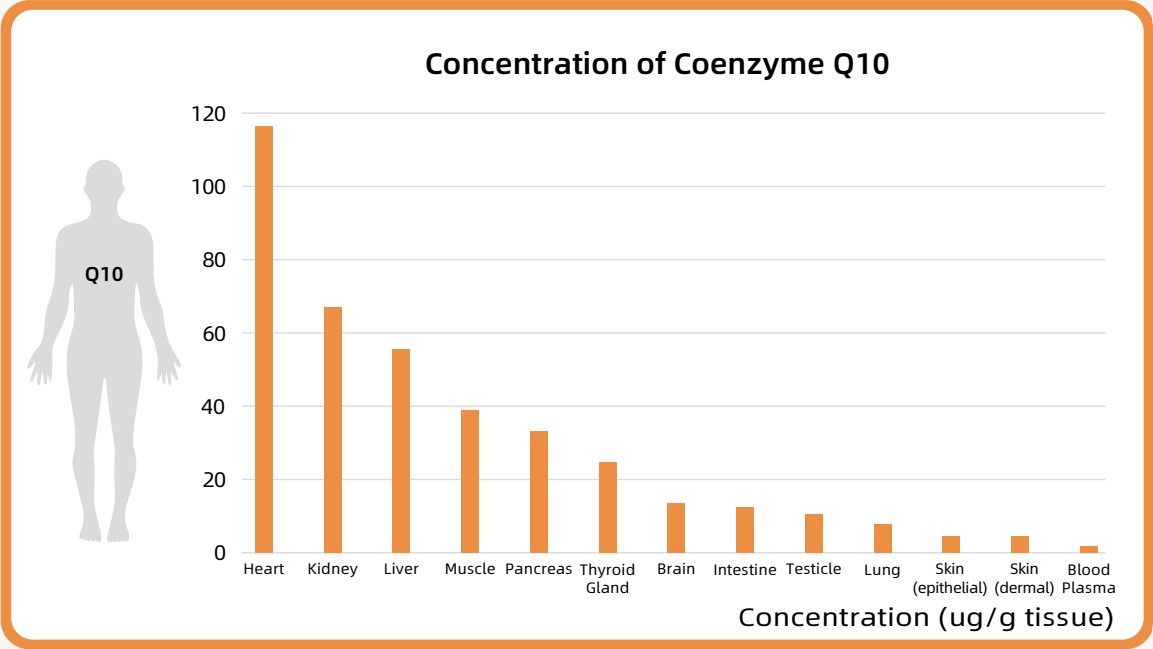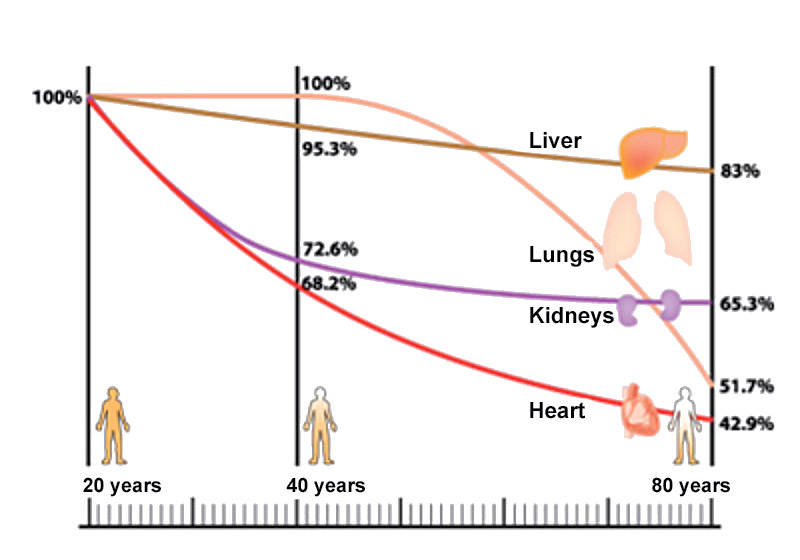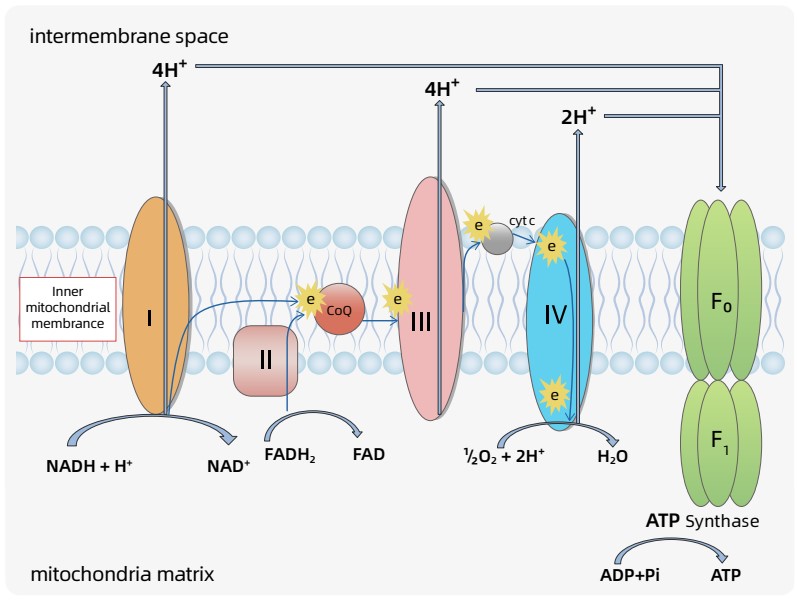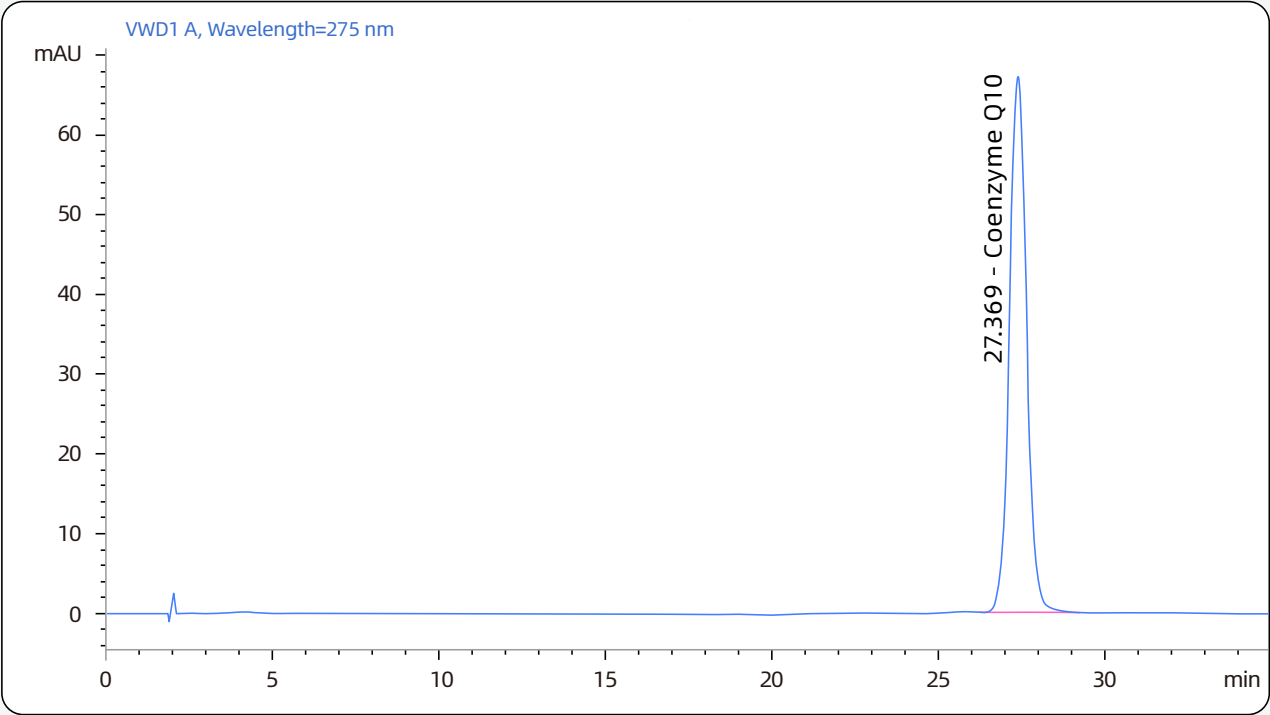Coenzyme Q10
Elevate Your Cellular Health
Supports Heart Health
Coenzyme Q10 has been shown to improve symptoms of congestive heart failure and may reduce blood pressure.
Helps with Energy Production
It plays a crucial role in the production of energy in cells, supporting improved energy levels and physical performance.
Antioxidant Properties
Coenzyme Q10 acts as an antioxidant, protecting cells from oxidative damage and reducing the impact of aging.
Supports Skin Health
Its antioxidant properties may help reduce signs of aging, protecting the skin from UV damage.
Improves Exercise Performance
By enhancing energy production in cells, Coenzyme Q10 can improve exercise performance and reduce fatigue.
Supports Brain Health
Its ability to protect cells from oxidative stress contributes to improved brain health and may reduce the risk of neurodegenerative diseases.
General information
Discovered in 1957, Coenzyme Q10 is crucial for cellular energy production. Identified first in bovine heart mitochondria, its importance extends through various health applications. Recognized by the US FDA for use in mitochondrial diseases, CoQ10 is also utilized as adjunct therapy in China for heart protection and hypertension.
Present in cell membranes, especially in the heart, liver, and kidneys, CoQ10’s concentration naturally diminishes with age, underscoring its significance for cardiac health. It plays a vital role in ATP synthesis within the electron transport chain and acts as a potent lipid antioxidant, preventing free radical damage and supporting overall health and anti-aging effects.
Source
Discovery of Coenzyme Q10 by Dr. Frederick Crane from bovine heart mitochondria
Dr. Peter D. Mitchell explains Coenzyme Q10's energy generation mechanism
Nobel Prize in Chemistry awarded for the discovery of Coenzyme Q10's role in energy generation within cells, based on Dr. Peter D. Mitchell's research
Dr. Karl Folkers awarded the Priestley Medal for determining Coenzyme Q10's structure
Distribution of coenzyme Q10 in human body

Coenzyme Q10 exists widely in cell membranes, especially in mitochondrial membranes, and mainly distributes in heart, lung, liver, kidney, spleen, pancreas and adrenal gland. Coenzyme Q10 is only 500-1500mg in the whole body, but it plays an important role.

Coenzyme Q10 levels decrease with age. At the age of 80, Coenzyme Q10 in each part of the body naturally declines to:
- Liver: 83.0%
- Kidney: 65.3%
- Lungs: 51.7%
- Heart: 42.9%
Therefore, the heart is the organ that needs CoQ10 mostly.
Change diagram of Coenzyme Q10
content in years

The main biochemical role of Coenzyme Q10 is to participate in a series of REDOX reactions of ATP synthesis as a cofactor in the electron transport chain. Since most cell functions depend on an adequate supply of adenosine triphosphate (ATP), so that it plays an important role in all tissues and organs of the body. Meanwhile, Coenzyme Q10 is one of the most important lipid antioxidants, preventing the production of free radicals, as well as changes in proteins, lipids, and DNA. Based on the above reasons, Coenzyme Q10 is generally believed to improve human health and anti-aging effect.
Energy Conversion Between Cells

Coenzyme Q10 Testing Map

Product Advantage
Coenzyme Q10 Highlights
+ NON-GMO
+ Energy Production Support
+ Powerful Antioxidant Defense
+ Natural Sourcing
+ Cardiovascular Health Maintenance
+ Immune System Support
Coenzyme Q10 Specifications
| DETERMINATION | SPECIFICATION | METHOD |
| IDENTIFICATION | ||
Color State | Yellow to orange Crystalline Powder | Visual Visual |
| ASSAY | ||
Purity (wt/wt% on dry basis) Coenzyme Q7, Q8, Q9, Q11 and Related impurities Isomer and related impurities Total impurities | 98.0-101.0% 1.0% ≤1.0% ≤ 1.5% | USP<621> USP<621> USP<621> USP<621> |
| TESTS | ||
Loss on Drying Residue on Ignition Mesh Size Tapped density Melting point Total Heavy Metals Lead (Pb) Arsenic (As) Mercury (Hg) cadmium (Cd) | ≤0.2% ≤0.1% =90% through 80 mesh 0.40g/ml-0.60g/ml 48°C-52C ≤10mg/kg ≤0.5mg/kg ≤1.0mg/kg ≤0.1mg/kg ≤0.5mg/kg | USP<921> USP<281> USP<786> USP<616>1 USP<741> USP<231>II USP<2232> USP<2232> USP<2232> USP<2232> |
| Residual Solvents | ||
Methanol n-Hexane Ethanol Isopropyl ether | ≤3000mg/kg ≤290mg/kgs ≤5000mg/kg ≤300mg/kg | USP<467> USP<467> USP<467> USP<467> |
| MICROBIOLOGICAL | ||
Total Plate Count Yeast & Mold E. Coli (/10g) Staphylococcus Aureus Salmonella (/25g) | ≤1000cfu/g ≤50cfu/g Negative Negative Negative | USP<2021> USP<2021> USP<2022> USP<2022> USP<2022> |